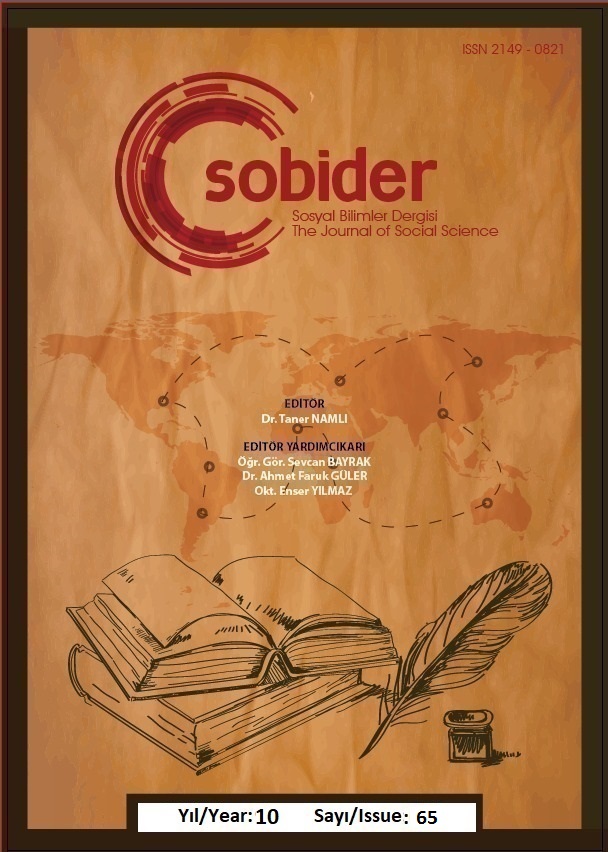Author :
Abstract
Güven, emniyet ve garanti manasına gelen sigorta, terim olarak riskin çoğalıp yaygınlaşması karşısında insanın kendisini ve sahip olduğu malları biraz daha güvende hissetmesi arayışının bir çabası olarak tarif edilmiştir. Modern çağa gelindiğinde ise sigorta kavramı, eskiye nazaran çok fazla geliştirilmiş ve neredeyse her alana uyarlanmıştır. Bu makalenin amacı ise belli bir teknik ve sistem içerisinde kaza veya kayıpların zararını telafi gayesiyle, karşılıklı ödeme ilkesine dayalı olarak ortaya konulan bu akdin/sözleşmenin İslam hukuku açısından caizliği/helalliği olgusunu irdelemektir. Nitekim İslam dini Kur’an ve sünnet çerçevesinde teavünü/yardımlaşmayı destekleyen birçok nassı/dinî hükmü ortaya koymaktadır. Bu çerçevede olgusal olarak sigorta kavramı prensipte İslam dininin maksatlarıyla çelişmemekle birlikte bizatihi ona hizmet ettiği görüntüsünü de ortaya koymaktadır. Ancak günümüzde sosyal sigorta, karşılıklı üyelik sigortası ve ücretli–ferdi sigorta yanında kredili hayat sigortası, birikimli hayat sigortası, mevduat ve katılım fonlarının sigortası, tekâfûl/alternatif sigortacılık, ticari sigortalar gibi daha birçok adını zikretmediğimiz sigorta çeşidi ortaya çıkmıştır. Burada olgusal olarak sigortanın caizliği/helalliği ve modern çağda ortaya çıkmış ve çıkması muhtemel olan sigorta çeşitlerini Kur’an ve sünnet bağlamında mâ’kulü’l-mânâ’ yani illetleri ve hikmetleri aklî olarak kavranan dinî hükümler ve maslahat/toplumsal yarar çerçevesinde yeniden değerlendirmeğe çalışacağız. Deliller her ne kadar bir olsa da İslam âlimlerince konuya yaklaşım ve değerlendirme farklı olmuştur. Çalışmamızda kadim/eski ve cedid/yeni bağlamında İslam’ın sabitelerini de esas alarak değişkenleri çerçevesinde konu tekrar irdelendi.
.
Keywords
Abstract
Insurance, which means trust, safety and guarantee, has been described as an effort to make people feel a little more secure in the face of the increase and spread of risk. In the modern era, the concept of insurance has been developed much more than before and has been adapted to almost every field. The aim of this article is to examine the permissibility/halality of this contract/contract in terms of Islamic law, which is based on the principle of mutual payment, with the aim of compensating for the damage of accidents or losses within a certain technique and system. As a matter of fact, the religion of Islam reveals many nassi/religious provisions that support cooperation/cooperation within the framework of the Qur'an and the Sunnah. In this context, the fact that the concept of insurance does not contradict the aims of the religion of Islam in principle, but also reveals the appearance that it serves it. However, today, in addition to social insurance, mutual membership insurance and paid-individual insurance, many other types of insurance that we have not mentioned such as credit life insurance, cumulative life insurance, deposit and participation funds insurance, takaful/alternative insurance, commercial insurance have emerged. Here, we will try to re-evaluate the permissibility/halality of insurance and the types of insurance that have emerged in the modern era and are likely to emerge in the context of the Qur'an and Sunnah, in the context of ma'kûl'ul mana, that is, within the framework of religious provisions and maslahat/social benefit. Although the evidence is the same, the approach and evaluation of the subject by Islamic scholars have been different. In our study, the subject was re-examined within the framework of its variables, based on the constants of Islam in the context of ancient/old and cedid/new





